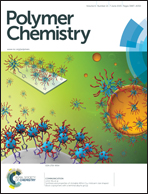Polyglycolic acid from the direct polymerization of renewable C1 feedstocks†
Abstract
We present a new approach to synthesizing polyglycolic acid (PGA) via the cationic alternating copolymerization of formaldehyde (from trioxane) and carbon monoxide (CO), sustainable C1 feedstocks obtainable from biomethanol or biogas. This method constitutes an inexpensive and efficient pathway for the synthesis of PGA, circumventing the usual route requiring glycolide. PGA was successfully synthesized with yields up to 92% from trioxane, 800 psi of CO, and 1 mol% triflic acid (TfOH) initiator at 170 °C over three days. 1H NMR, 13C NMR, and FT-IR spectra of the polymer from CO and trioxane are identical to those of commercial PGA prepared via the ring-opening polymerization of glycolide—confirming the alternating microstructure. Although high copolymerization conversions were obtained, molecular weight analysis usually suggested the formation of oligomeric glycolic acid (OGA). High molecular weight PGA can be obtained via post-polymerization polycondensation of OGA catalyzed by Zn(OAc)2·2H2O. Alternatively, increased molecular weight PGA can be achieved by inclusion of glycerol as a branching agent during the C1 copolymerization.


 Please wait while we load your content...
Please wait while we load your content...